“The Journey Is Our Home”
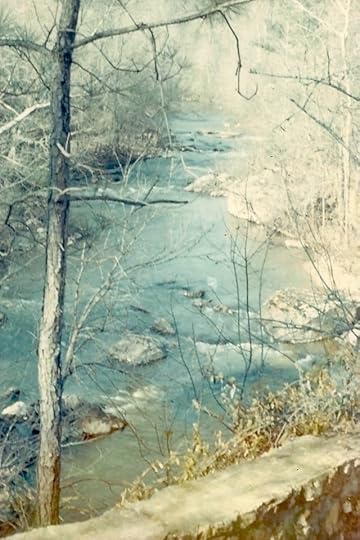
This blog was first published on January 6 2016 at stevewiegenstein.
I have recently read, considered, and finally expanded it, not quite satisfied that it developed fully what I wanted to say. I have searched for Home all my life. It is an important subject for me.
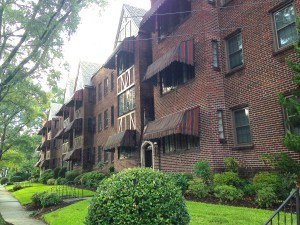
A few weeks ago a friend and I walked to the Chinese restaurant near my co-op and brought back steaming cartons of vegetable lomein, fried rice, two Spring rolls, and my favorite—roasted broccoli (enough to save for lunch the next day). The order—white cartons stacked neatly in a large white bag—of course included small packets of soy sauce and several fortune cookies.
I always look forward to the slight crunch and sweetness of fortune cookies after the salty Chinese food, but the two I grabbed that day were stale. I was on the verge of throwing them out, along with their predictions for my future, when the edge of a slip of paper caught my eye. It read:
“You will find luck when you go home.”
That piece of paper, greasy at one corner, wrinkled from its near-miss with the garbage, is taped to the door of my kitchen cabinet.
“I know that our relationship to those places we inhabit and leave and for which we search is the informing metaphor of the spiritual life in any tradition and is, in fact, the governing reality in our lives; the spirit of place is in our bones” (Looking for Lydia; Looking for God, 116-117).
I grew up in the South, in the hills of North Georgia, and so—even more than most—I have that bone-deep sense of belonging to a place, of that physical bond with land. In his small novel, The Unvanquished, William Faulkner describes the forced and hasty departure from home of two boys, with their grandmother, just ahead of Sherman’s army. They take along basic provisions—and bags of soil from the plantation.
One morning about twenty years ago, one of my cousins and I drove out to the land where I grew up. We were going to see the log house my parents built which neither of us had seen since I left for college at seventeen.
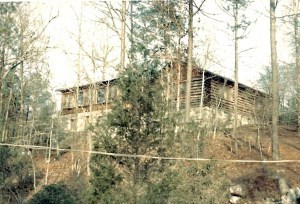
After the house was built, Mother and Daddy carefully cleared narrow paths into the woods and down the steep hill between the house and the “patio,” a structure made entirely of mortar and large stones from the creek bank. On the day my cousin and I were there, all those paths were completely grown over; there wasn’t a trace of them. We sat for a few minutes, looking with a kind of hopelessness at the uninterrupted woods, seeing no possibility for navigation.
I glanced back once and stepped out of the car. I walked cautiously, but without hesitation, across the overgrown yard and onto the invisible path that led by twists and turns through a quarter acre of dense trees and underbrush to the edge of Cedar Creek. Those stones and trees-or rather my sense of them-that path, buried in thick vines and roots and many seasons of leaves, are my bones.The skeleton of that land is my skeleton. I never faltered. My cousin followed. We sat by the creek for more than an hour without speaking.
There is a reason that all those houses and apartments and rooms over all those decades never quite satisfied my search for home. Not one of them, even the 1928 co-op, in the old walking neighborhood where I live now, ever will be home. Not even that path through those beloved woods is home.
Home is not a place, not a location, neither house nor woods nor hills nor any ocean. Home, as Esther de Waal writes in her 1984 book, Seeking God: The Way of St. Benedict, is a sense of being “earthed;” it is the Biblical concept of stability or steadfastness.
Of Metropolitan Anthony, “a monk and a bishop,” she says only,
“He has found his centre of gravity; he is wholly inside himself. This is the stability of the heart.”
A physical home, the particularity of place, is significant because it points always to something beyond itself.
It points to home. It is not, itself, home.
A hymn whose name and provenance I have forgotten includes this line:
“We are all God’s children; the journey is our home.”
And, finally, this road to our real home can never be easy.
De Waal comments on Benedict’s guidelines for the reception of the novice monk:
“‘Do not grant newcomers to the monastic life an easy entry’ says the opening sentence, and the novice is to be left knocking at the door for four or five days. He is then warned about ‘the hardships and difficulties that will lead him to God’. . . If he promises perseverance in his stability after two months. . .If he still stands firm. . .he is taken back. . .and is tested again after six months, and then again four months later. The phrase used each time is ‘if he still stands firm.'”
And from the same chapter of Looking for Lydia, called “The Houses We Build; The Places we Inhabit.” this fragment of memory:
“At age seventeen, I closed the door on the house in the woods and left for college; I closed the door, looked away for only a minute, and home disappeared behind me. By the time I came back for my first weekend, my mother had rented the log house to the people who would eventually buy it, and had moved to Alabama, where her sisters lived. I have spent most of my life looking for home. I have looked in the houses I’ve owned, in the apartments I’ve rented, in borrowed rooms, in other people’s houses, in churches, in synagogues, in sweat lodges, around every corner. In these old brick buildings in the middle of a city I barely know, no woods anywhere, perhaps I have found it.”
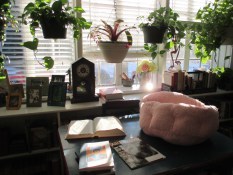

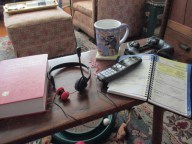
But have I found it? Is it, in fact, something to be found? The legend of the Holy Grail never includes some determined knight’s finding the Grail. The Holy Grail is a metaphor for all those things we never find, all those things for which we search. The journey is our home. Or, as I read on one of the social media this week,
“the detour is the road.”
Not all the questions have answers; not all the journeys are toward a destination; not all our searching leads to finding. Home is farther away, and much closer, than we ever imagined.
“We will find luck when we go home.”
The post “The Journey Is Our Home” appeared first on Dean Robertson.



